The Elves and Orcs, then, took Camor for themselves. Meiriris was appointed as the first Queen of the Elves and Amukk was called Chief of All Clans. For some years, they lived peacefully.
Driven Out
Galgeon Lusisce was Meiriris's right-hand man, and he spearheaded a campaign not long after the revolution. First, it began with some Orcs being killed mysteriously. Then, messages began appearing telling the Orcs to leave. Finally, Galgeon began to actually tell them to leave Camor or die.
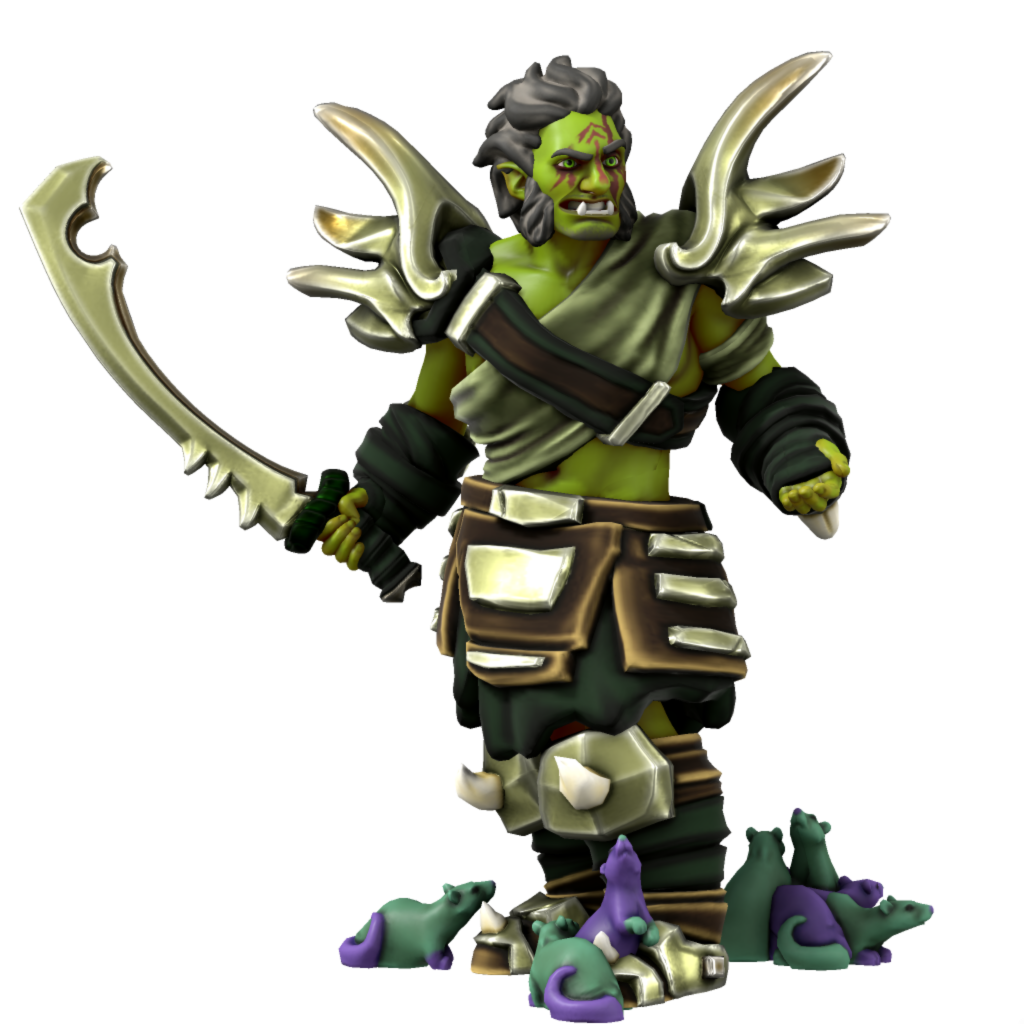
Bud the Hollow by Jarhed
Amukk tried to fight, but after so many deaths, his soldiers were not behind him on it. They feared dying. So he agreed, leaving across a small landbridge that existed between Elone and Udai. He settled down in Kruldran, but would die soon after to a force of Devils sent by Satanael from the nearby
Crimson Court. Satanael does not forget, nor does he forgive.
The Beastman Genocide
For quite some time after Amukk, the Orcs were split up. It was likely the Korvians that spread enough propaganda to get them to do so, though many blamed all sorts of Beastmen.
Finally, in -424, an Orc named Bud the Hollow became a Tribal Chief, and started to unite all of the tribes together once more against this common enemy of the Beastmen. These included:
- Korvians
- Mammen
- Crocutions
- Felids
- Minotaurs
- Lizardfolk
- Satyrs
- Centaurs
and most importantly - Ratfolk
Bud blamed them for the state the Orcs had been in: at war with themselves, broken apart and not united. He told his people that the Beastmen feared a united Orcish society, and so they must bring exactly that to the people of Udai. If the Beastmen didn't want the Orcs to unite, then the Orcs would unite. If the Beastmen did not want the Orcs to attack, the Orcs would attack. Anything the Beastmen feared, the Orcs would bring.

Wiscys Nicandir by Jarhed
Bud would lead his army throughout Udai, uniting them into what he called a Grand Clan. He renamed the united Orcish society of Amukk God Breaker to a Grand Clan, and took up the title Amukk had as well as the Chief of All Clans.
With his Grand Clan, Bud would strike fear into all Beastmen. He even wiped out all but one of the Ratfolk, with that final one, named Radt, being taken in by the Korvians for protection. Bud would even destroy settlements the Korvians and Mammen had outside of their capitals, which is why
The Korvian City and Ruzrugh are their only major settlements. Any others were destroyed by Bud the Hollow.
The Witch
Wiscys Nicandir, the fourth
Grand Wizard of the Draconians, saw the threat Bud posed to not only Udai, but all of Totania. She knew what it was like, as she was hated by many in her own lands, being the origin of the term Witch.
Wiscys traveled to Udai, breaking a rule of hers that she had made. This rule was that she would never harm an innocent person. To kill Bud, however, she had no choice. He was too strong and he rarely ever left his army.
But if she spread a disease spell into a town he failed to conquer and said they were weak, he would come to take it. She knew, too, that he wanted his people to prosper. He would not risk his army. He would come alone. And if he was alone, Wiscys could take him. Of this fact, she was confident.
Wiscys did kill him with the disease, but ultimately died of it herself. Neither body was found for some time, but this was the end of the Beastmen Genocide, as the Korvians led the Beastmen to split the Orcs apart once more, breaking up the Grand Clan.
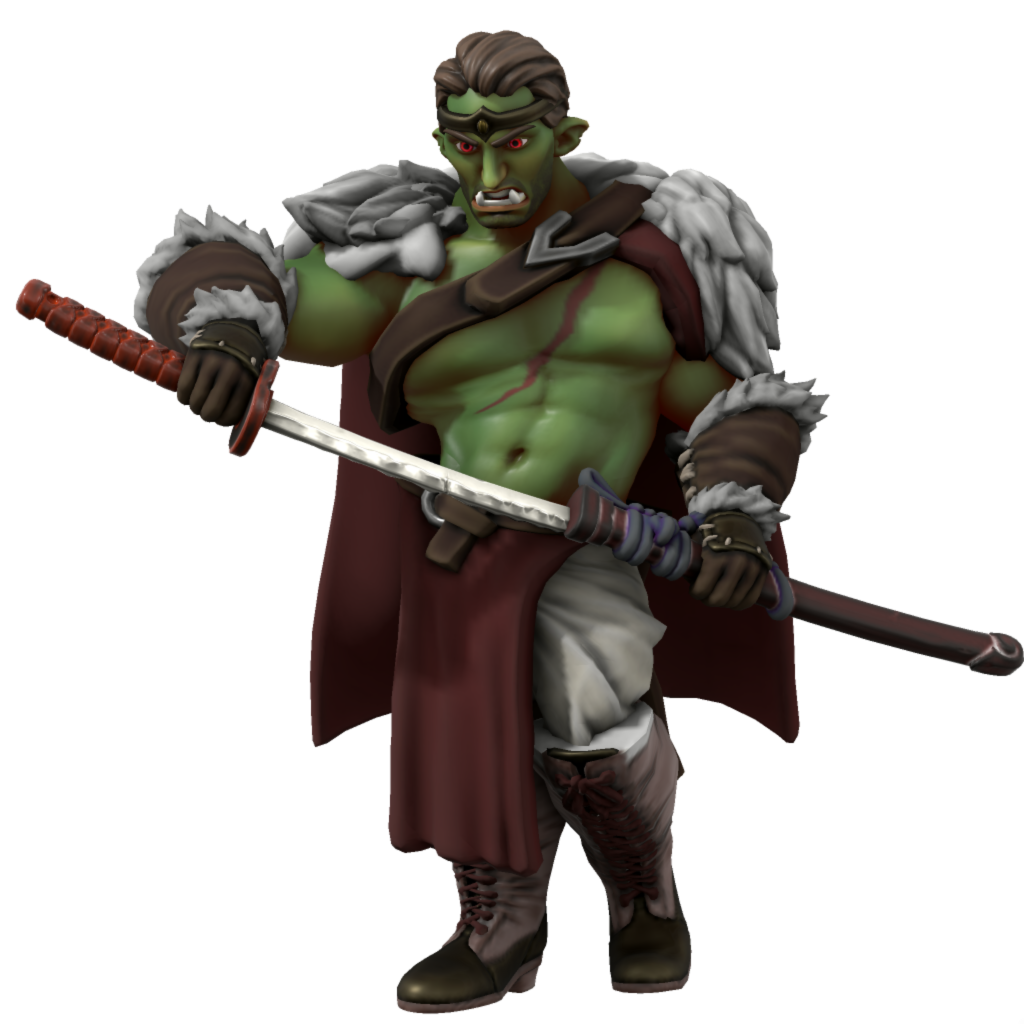
Amukk by Jarhed
The God of Mercy
In the year -15, a Tribal Chief brought together multiple clans once more. He was unable to get every clan, as some believed his plight to be a fool's errand. Others, however, believed in this man. After all, he was an incredibly powerful, passionate, and just Orc warrior. A man by the name of Amukk.
Amukk knew there was a vacancy among the Gods. He had heard tales of the
Nameless God sitting on his empty throne, and sought to unseat him. So Amukk gathered an army of Orcs, even convincing some Korvians, Mammen, and Lizardfolk to join his cause. He was not called the Chief of All Clans. He was called the Chief of the Gods. For he would right the wrongs of Heaven and bring order to Totania. Justice. That was his promise to the people.
This began what was called the War of Mercy, where Amukk charged into Heaven itself with the aid of his army and the Goddess
Helle. He succeeded in defeating the Nameless God, but was unsure of whether he should truly take his place. So Amukk retreated back, suffering heavy losses. As a result, Humanity was brought to Totania.
The United Holy Front
Amukk decided it was truly time to become a God. He brought not just his previous army, but even forces of
Dwarves, Elves,
Draconians, and Kamejin to help.
Amukk ascended to Godhood and would become the God of Mercy, Beginnings, and Justice. He became the patron of
The World Court, embracing their brand of justice. Many wonder if he truly endorses their actions, but no one has thought to ask. Because Amukk was the man who first truly brought the world under one ideal: justice.
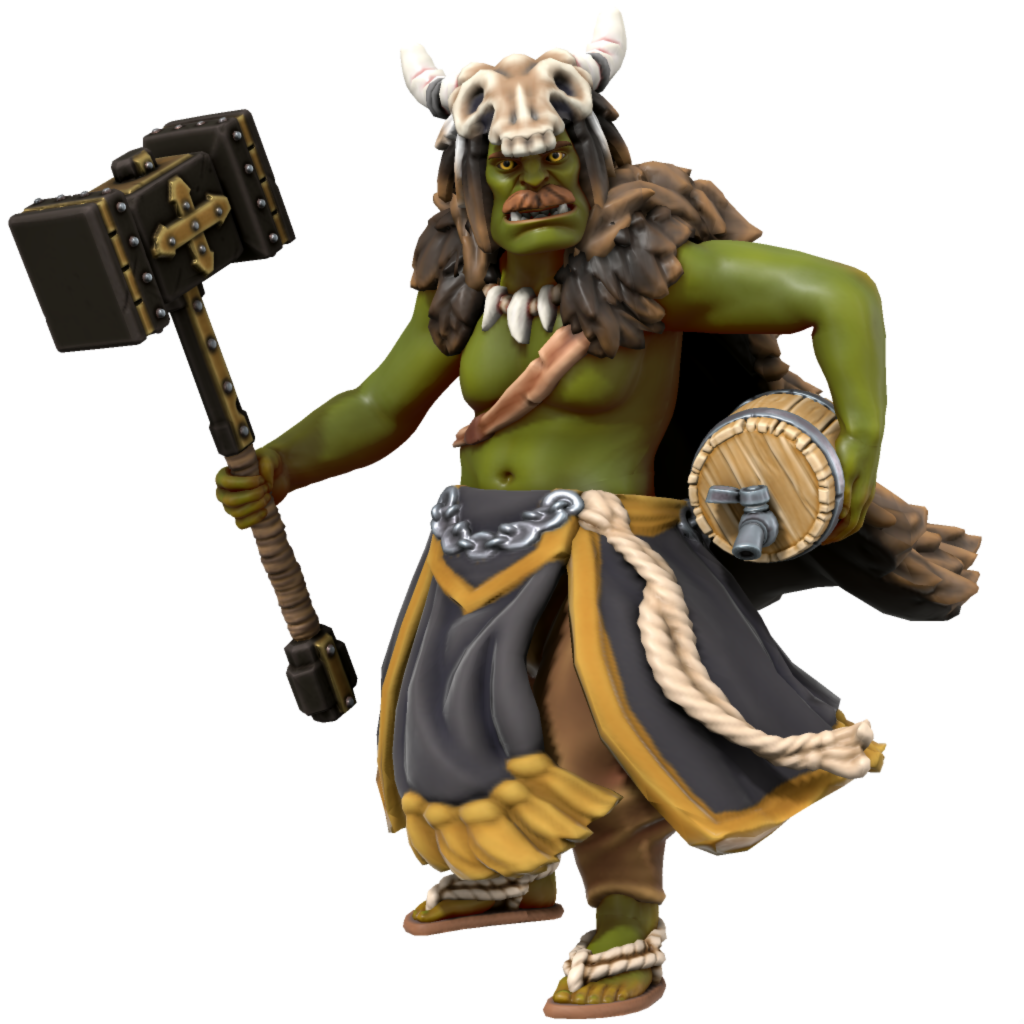
Mash by Carrey_adler_peart
The Divine Hero
There was a young Orc who struggled in this time. Amukk may have made many happy, but the Orc named Mash lost all of his loved ones in the War of Mercy. For this, he did not worship Amukk, nor did he worship Nergal. Instead, he followed Irkalla, Goddess of Loss and Grief, helping others get over their losses while also dealing with his own.
He went to
Nerodil during the year 20, where he joined up with other Priests and dealt with a threat that was not fully identified as of now. With this, he was called one of the Divine Heroes, alongside those like Amara, Dhurnas Blackmane, Velthen Saseth, Tankean Nimphonker, Ishii Daisuke, and Entropy.
After that, Mash settled down, continuing his work as a grief counselor. He was happy to have helped contribute and prevent more loss from happening in the world, but his goals as a hero were less in combat, and more in helping people hail from the pain of the past.
Monster
A woman was born in the Orc village of Urd Grabad, to Tribal Chief Gunn. Her name was Shatlita, but as she grew up, she began to be known by a different name. A name that was only said in whispers or screams: The Monster of Urd Grabad.
Shatlita would do most of her fathers work for him, invading and pillaging villages, defeating rival clans, and keeping the people of Urd Grabad safe and happy. All but one.
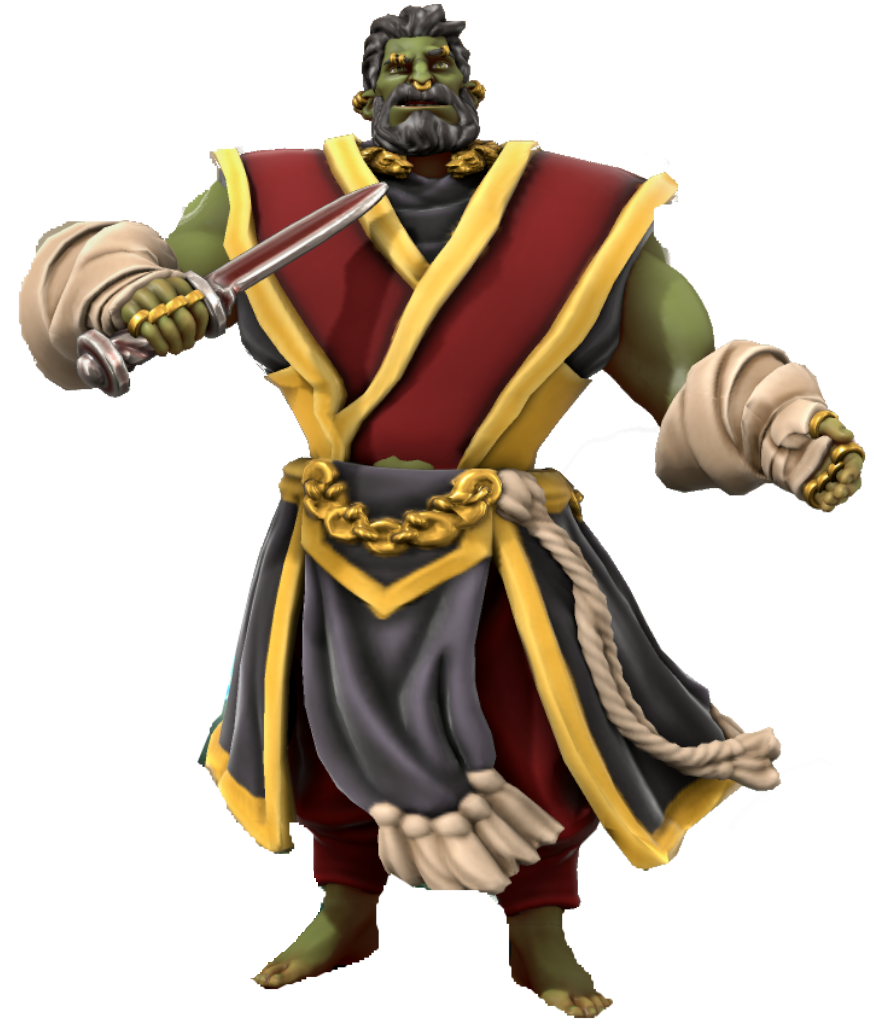
Gazzok the Butcher by Jarhed
Gazzok the Anguished wanted Shatlita to acknowledge him. He was her childhood friend and always stuck by her side, but he was weak, and Shatlita did not want someone weak by her side. He may have loved her, but she did not love him. Still, they were to be married.
Shatlita led a raid on the Mammen city of Ruzrugh. Many wonder why she did it, but her reasoning was likely exactly what the end result was: she wished to rid herself of Gazzok. Gazzok was seemingly killed, and Shatlita ran off with a human named
Roref Moondancer Gunn.
The Butcher
Gazzok, however, had survived, and gained Deconstruction Magic. With it, he grew stronger and ultimately attacked Urd Grabad, driving Shatlita and her Half-Orc son,
Shatt Gunn, out of Udai and killing Roref. Gazzok, after that, seemingly disappeared for a bit until teaming up with
Salasar Feaphed, the 64th
Grand Wizard of the Draconians, and killing some of the Korvian's Twenty Immortals.
Salasar betrayed him and fled, but Gazzok then made a deal with Lord Cinder, a Fire Jinn Count in Ruzrugh, and Gazer, one of the Twenty Immortals. A deal to take care of Shatt Gunn once and for all.
Marshal of the Revolution
Shatt Gunn would go on to bring a large amount of prominence to his own name, despite his mothers infamy. He would become a symbol of unity across Elone and Totania as a whole.
Shatt Gunn was recruited by Salasar Feaphed to join the Magic College Class of 550. After he joined, he also became part of a scholarly group Salasar created called the
Weave Initiative, dedicated to studying the source of magic itself.
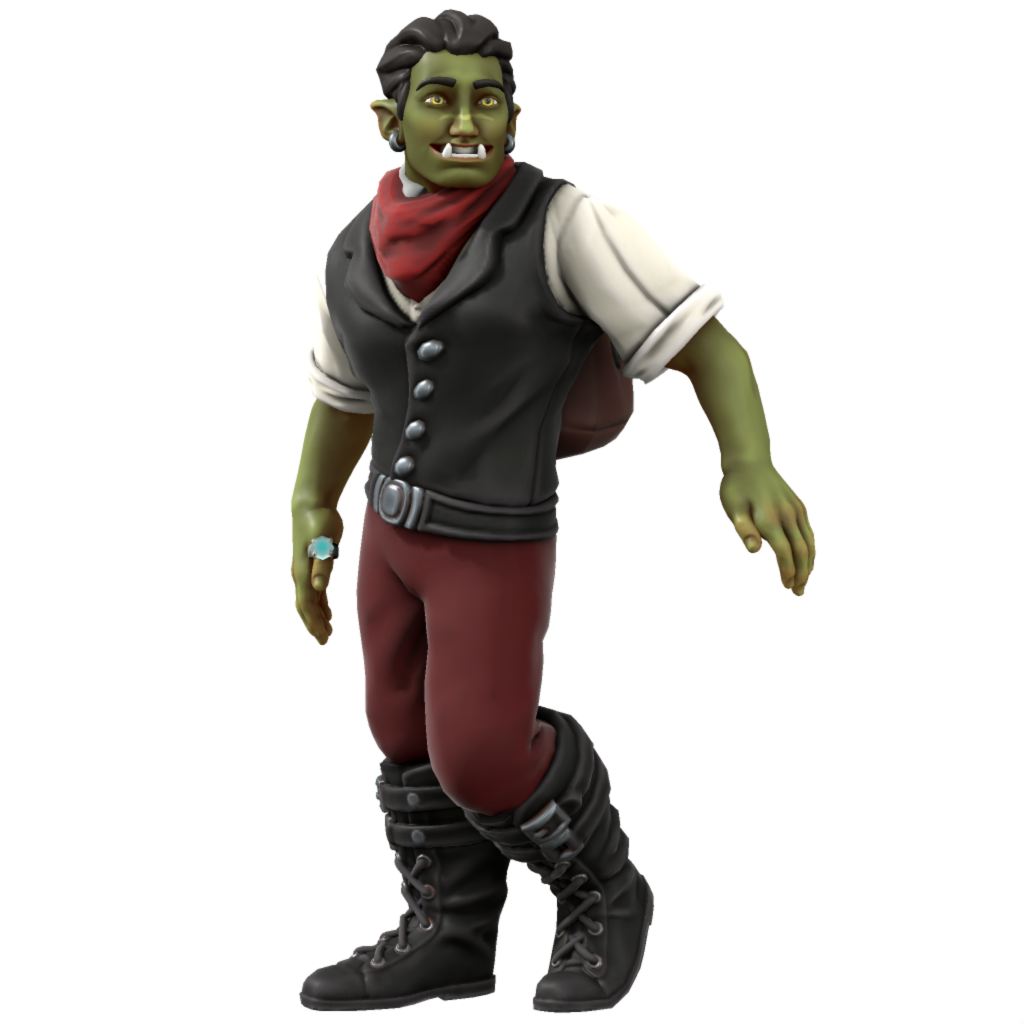
Shatt Gunn by genuinetrickster
Shatt became the defacto leader of the group, as he was the unifying force of positivity. He was a ball of sunshine who brought them all together, and would learn to lead through his experiences with them.
Shatt also dealt with the sins of his mother in the form of a vengeful refugee named Zasagur, then joining the
Army of the Revolution and being adopted by the founding
Marshal of the Revolution,
Fepar Tilrak.
Shatt was deemed responsible for the crash of the
Hot Airship the
Yùzhào, but ultimately he became Marshal of the Revolution and helped to put a stop to the Dwarven Civil War that the crash caused. He was the adopted brother of two other famed heroes of the time,
Nalrik Tilrak and
Caddos Damolnath, yet still his name stands on its own.
Culture
Quick Glance Culture
Quick Glance Culture is a product of an Orcish philosopher whose name has been lost to time. It developed due to how often Orcs would die young, as they can supposedly live incredibly long lives, but rarely make it past the range of 40-50 years old.
What Quick Glance Culture entails is that everything Orcs do can be done and understood in a quick glance. Be it eating, consuming media or literature, learning something, or falling in love. The only thing they savor is battle, as they know that it is what they are likely to die from, and that any fight could be their last. Therefore, they allow fights to last incredibly long so they can savor their potential final moments of life.
Quick Glance Culture is believed to be slightly carried over from that of the nearby Korvians, whose natural lifespans extend at most into their twenties. Due to this, Korvians have a similar fast paced culture to Orcs.
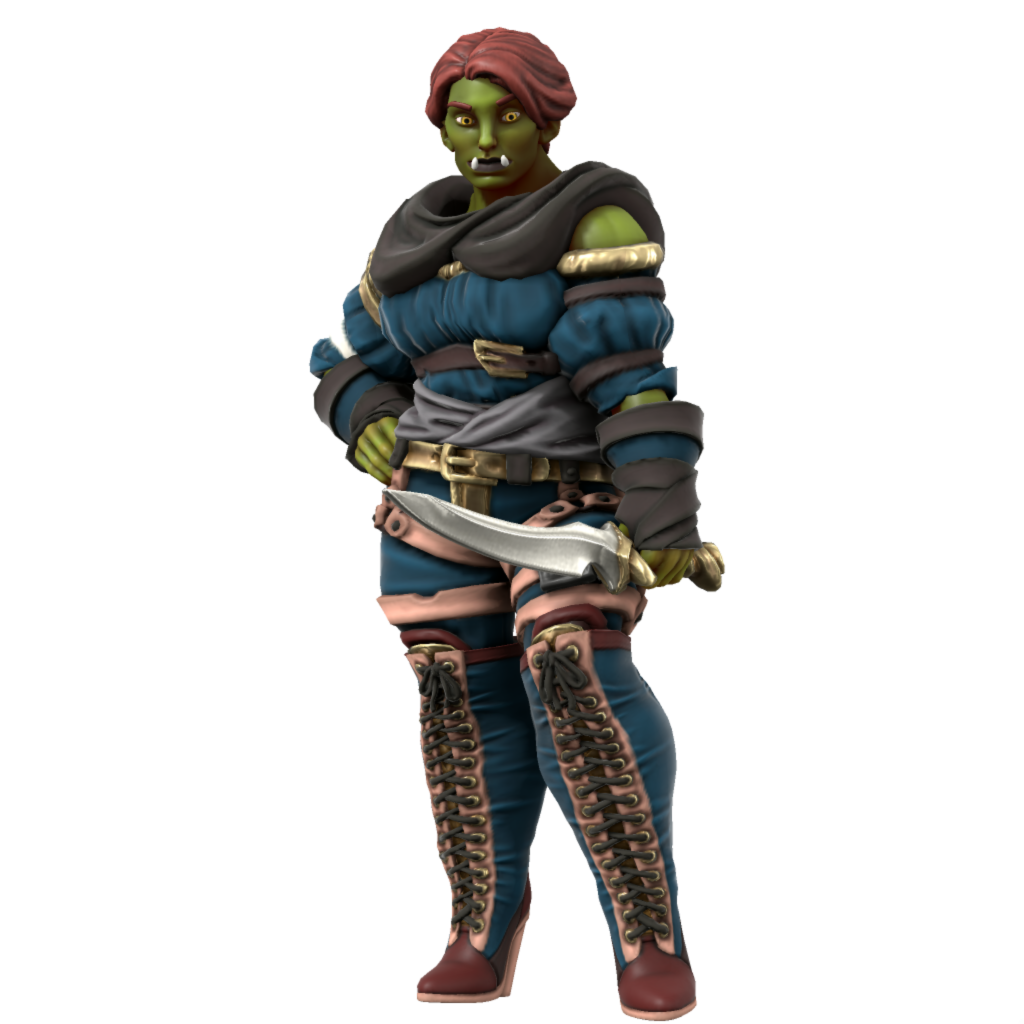
Shordi Sux by Jarhed
Art
Orcish art is normally not something with an inherently deep meaning. After all, it must adhere to Quick Glance Culture. Therefore, most Orcish art is fairly simple, images of battle or sports. Even their songs are often short and easily repeatable, to the point one could loop it for eternity and never know.
Counter Culture
There was an Orcish counter culture movement after the Beastman Genocide, where many Orcs wished to go against the idea of Quick Glance Culture. This has lasted especially long in art, where there will be Orcish paintings that require thought to consume. Paintings of peaceful images where one can get a feeling beyond fear of the future. Songs with unique melodies and interesting messages. Something that goes beyond just a quick glance.
Courtship
Orcs find love fairly fast compared to most other races. They wish to have a partner to love, to fight alongside and against, and to have children with. This way, they have more people to love and fight alongside and against.
Orcish weddings are often bloody gatherings, as they will invite an enemy of the clan to the wedding. The newlyweds are then meant to duel the enemy and, if they win, bathe in the enemy's blood to consumate their marriage. Further consumation is done at the wedding as well, but if there is not at least one death, the wedding is considered a dull affair.
Public displays of affection are not only embraced in Orcish culture, but are often expected. It is, to the Orcs, the best way to show others their love. Orcs have no shame, as they are willing to kill in front of others, so why should they not be able to do anything else in the public eye?
Language
Orcish language is derivative of Elvish, as the two initially were the same language, once called Grehni after their God and Goddess, Nergal and Selene respectively. The two languages evolved separately and, now, Orcish seems almost like a mockery of Elvish. The letters of Orcish are drawn crudely, as Orcs do not take time to write their letters, instead rushing to get their thoughts down as fast as possible.
Orcish language features similar words, but they are shortened in many ways and turned into slang. Elvish literary critic
Imvis Valhana once said of the Orcish lanuage:
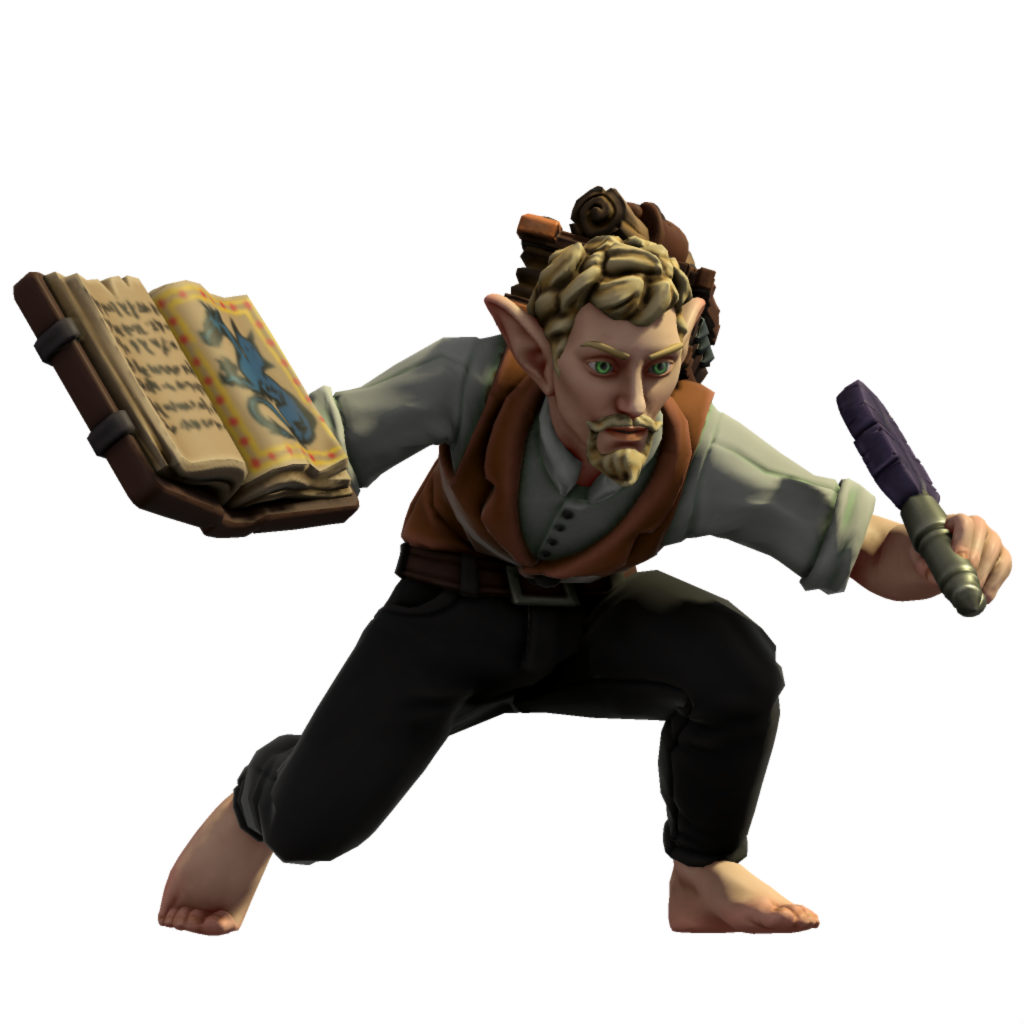
Imvis by Jarhed
"They almost sound like they're trying to see how ridiculous they can make Elves sound. The answer is simple: very. Both languages are, in essence, equally ridiculous of course. I simply grew up on one side of the pond and they another. If I were green, perhaps I too would have simply wanted things to go by a little bit faster. Who can blame them?"— Imvis Valhana
Education
Orcs are often called dumb, and Elves propagate an idea that they are simply born this way. This is only true if one considers all races dumb from birth. The truth is simply that, in Quick Glance Culture, education is not necessarily valued. Why waste time learning when you could train to fight?
Still, those Orcs who learn they have magic are often given a great education, as Orcs are aware that magic is tied to ones intellect, and want powerful mages. Not only do they want them, but they treasure them, more than any race on Totania.
Half-Orcs
Half-Orcs are treated with love by Orcs, unlike many other half-breeds around the world. Orcs do not care how much Orc someone is, as long as they are an Orc and they accept that they have Orc blood in them, they are loved. Even if they do not, Orcs often accept them, as they know at least that the Half-Orc is part Orc.
Biology
Height
The average Orc height is around 6'2", though there are many who are taller than this, and some who are shorter. Orcs are known to reach up to even 10 feet tall in some cases, which terrifies many races across Totania.
Skin
Orc skin is, famously, green, which leads to a derogatory nickname of "Greenskins." It is unclear why Nergal gave them green skin, but it is said by many that it is to contrast the red of the blood they stain themselves with.
It is not a single hue of green, being actually many shades. Often, other races do not see much difference, but to Orcs there are often feuds between those of one shade of green and those of another. To the rest of the world, it seems almost incredibly arbitrary, but still it persists. Prejudice takes many forms, after all.
Their skin is notoriously tough to pierce, tougher than most races other than Emetians and the scaled races like Draconians and Lizardfolk.
Diet
Orcs are mostly known as carnivorous, but in truth they are omnivores. They grow crops, but consume them quickly to the point that few outsiders ever actually see any crops from the Orcs. This is also an idea that stems from the lack of trade coming in or out of Orcish settlements to non-Orcs, leading non-Orcs to be unaware Orcs even have agricultural systems or any fruits or vegetables at all.
Lifespan
Orcs are said to be able to live to be around 300 years old, though there are very few who ever reach this age. This is due to their Quick Glance Culture, alongside the penchant for violence they are raised around. Most die before they reach the age of 50, bringing the average life expectancy to around 40-50.
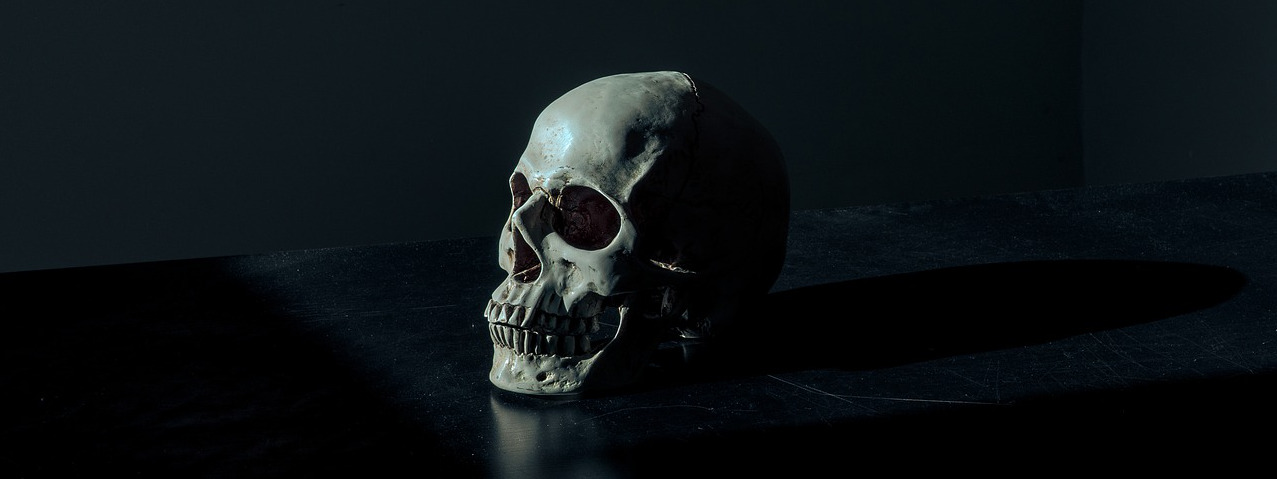
Comments